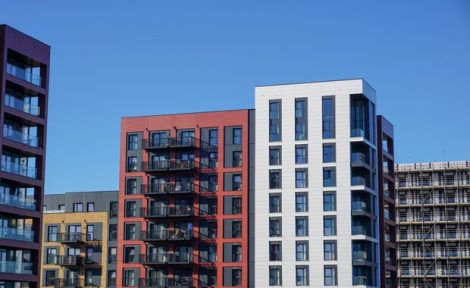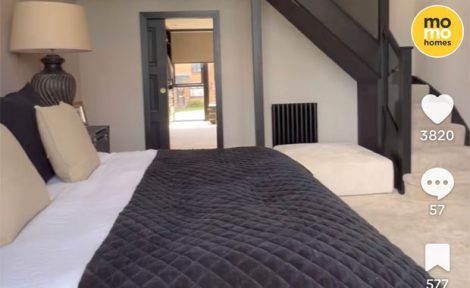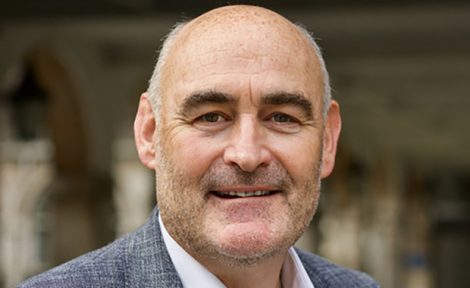Build back better
As the UK emerges into a post-pandemic era, will we witness a sea-change in the property industry, with more efficient working practices – or will it be back to square one? Richard Reed reports.


We have seen the collapse of big-name high street retailers, falling like dominoes as consumers, imprisoned in their homes, turned to the internet en masse.
For estate agents, Covid restrictions have been the drivers of change on an unprecedented scale.
Are high street agencies about to go the same way as retail, or will the industry embrace a brave new world?
The Negotiator talked to a range of experts to gauge their views – and most felt there would be a long-term shift in the way business is carried out.
Technology
 “I don’t see anything going back to the way it was,” says Mick Silver, founder of Moovshack. “You can’t uninvent things and you can’t change the past. Even the most reactionary of agents who thought they didn’t need any technology because they are a ‘people’ business have had to use tech to engage with people over the last 12 months. Without Zoom or the equivalent where would we be? Most of us had never used that stuff, now I’m having four or five Zooms a day.”
“I don’t see anything going back to the way it was,” says Mick Silver, founder of Moovshack. “You can’t uninvent things and you can’t change the past. Even the most reactionary of agents who thought they didn’t need any technology because they are a ‘people’ business have had to use tech to engage with people over the last 12 months. Without Zoom or the equivalent where would we be? Most of us had never used that stuff, now I’m having four or five Zooms a day.”
Even the most reactionary of agents who thought they didn’t need technology because they are a ‘people’ business have had to use tech to engage over the past 12 months. Mick Silver, Founder & CEO, Moovshack.
He thinks the future shape of the industry will be driven by consumer demand.
“Covid is not going to go away, it’s probably going to be with us forever. The fear that has been stoked is going to mean the consumer will lead the way and that means safe transacting.
“What serves the consumer best? If we understand that’s the prime principle to follow, everything naturally follows on from that – consumers want easy 24/7 access to stuff. Information, at least, if not transactions; they want one-stop platforms if possible. Who wants to jump on five trains if one train will get you there?”
However, Silver doesn’t ever see physical viewings ending completely. “I don’t think it’s going to be seismic in the way it was with retail. Buying a property is the biggest transaction most people will conduct; that’s not going to go all online by any means, but the way agents engage will change.”
 Peter Everett, head of agency (UK) at Offr, sees agents falling into three camps when restrictions end for good – those who go back to work and “carry on as if nothing happened”; those who have used the past 12 months to experiment with technology, and will continue to adopt new ways of working; and those in the middle who will “wait and see” which way the industry is heading.
Peter Everett, head of agency (UK) at Offr, sees agents falling into three camps when restrictions end for good – those who go back to work and “carry on as if nothing happened”; those who have used the past 12 months to experiment with technology, and will continue to adopt new ways of working; and those in the middle who will “wait and see” which way the industry is heading.
Agents very quickly realised that virtual viewings were saving them time… some businesses used to do 25-30 viewings to get a sale, which is absolutely nuts. Peter Everett, Head of Agency (UK), Offr.
Virtual viewings
He believes virtual viewings have been the biggest single gamechanger. “Circumstances forced them to go down that route – some agents had used nothing more sophisticated than a CRM system,” he says. “Then a lot of agents very quickly realised that virtual viewings were saving them time and helping to prequalify buyers. I’ve heard anecdotal evidence that some businesses used to do 25-30 viewings to get a sale, which is absolutely nuts if you think about the time and trouble involved.
“With virtual viewings you only get three or four buyers round there and one of those is probably going to buy the house.
“I was talking to an agent up in Newcastle who said, ‘This has really opened our eyes, we want more self-service in the process earlier on so we can spend more time talking to our serious clients and try to eliminate the tyre-kickers.’” It’s a theme echoed by several of our other experts.
 Rollo Miles, director of hub agency Agent & Homes, agrees that virtual viewings have transformed the way business is transacted. “Our physical viewings were down [after the first lockdown] but every viewing we were doing was a second or third viewing, because people had already looked at the house virtually.”
Rollo Miles, director of hub agency Agent & Homes, agrees that virtual viewings have transformed the way business is transacted. “Our physical viewings were down [after the first lockdown] but every viewing we were doing was a second or third viewing, because people had already looked at the house virtually.”
Our physical viewings were down, but every viewing we were doing was a second or third viewing, because people had already looked at the house virtually. Rollo Miles, Director, Agent & Homes.
Inevitable shift
 Cliff Thomas, head of business development at The Letting Partnership, believes a continuation of the move online is probably inevitable. “Whatever the move to online was predicted as being in the last 10-15 years it’s been accelerated. People are more comfortable with virtual tours than they were. You’ve got people in their 50s and 60s happy to take on the medium now because we’ve been forced to, whereas the younger generation take it as normal. My gut feel is that it’s just accelerated that.”
Cliff Thomas, head of business development at The Letting Partnership, believes a continuation of the move online is probably inevitable. “Whatever the move to online was predicted as being in the last 10-15 years it’s been accelerated. People are more comfortable with virtual tours than they were. You’ve got people in their 50s and 60s happy to take on the medium now because we’ve been forced to, whereas the younger generation take it as normal. My gut feel is that it’s just accelerated that.”
People in their 50s and 60s are happy to take on the medium now because we’ve been forced to, whereas the younger generation take it as normal… it’s just accelerated that. Cliff Thomas, Head of Business Development, The Letting Partnership.
However, he thinks there will still be a demand for physical viewings. “I think agents will have to offer both, you can’t do one without the other. If someone wants to view a property you have to be able to offer it, don’t you.”
Sam Hunter, founder of sales prospecting firm Homesearch, says he hopes things don’t just go back to the way they were. “Agents are asking better questions of buyers, sellers, landlords and tenants before saying ‘Come and see it’. They are wasting less time and that hopefully puts a bit of time back in their day to do the core activities that matter, so that when the market does slow down they don’t think their throats have been cut.”
More sustainable
Ross Nichols, co-founder of home set-up service Just Move In, says the changes that have been forced on the industry offer a great opportunity to do business in a greener, more sustainable way.
“Agents are very people-focused, doing things online was almost frowned upon before,” he observes. “You would travel around the country [meeting business partners] which wasn’t a particularly efficient use of everyone’s time and wasn’t very good for the environment.
“I think people are more comfortable doing video meetings and actually not travelling so much as they used to, and that’s something I hope certainly lasts.”
However, while he thinks virtual tours are a boon – ‘If you can view 10 or 20 videos online in one week it’s a no-brainer’ – he thinks physical viewings aren’t going to stop any time soon.
“If you are going to rent somewhere for six or 12 months, making a decision online will become easier for people to do, but buying a property is very different; it’s a much deeper commitment,” he says. “You will get people doing first viewings online, but I would still want to see a property before actually putting an offer in – it’s such a big transaction, you want that assurance.”
Walk-through tours
One of the biggest beneficiaries of the sudden switch to virtual viewings in 2020 has been Giraffe360, a leading provider of 3D cameras. The company leases the equipment to agents and also carries out all the editing to create a polished 360-degree ‘walkthrough’ tour for potential buyers.
 CEO Mikus Opelts says the business grew 300 per cent last year, though he doesn’t put it all down to Covid. “It’s a combination of factors,” he says. “Agents today need many different types of content to present properties online – floorplans, photography, virtual tours – we can use our technology to provide all these things.
CEO Mikus Opelts says the business grew 300 per cent last year, though he doesn’t put it all down to Covid. “It’s a combination of factors,” he says. “Agents today need many different types of content to present properties online – floorplans, photography, virtual tours – we can use our technology to provide all these things.
Agents need many different types of content to present properties online – floorplans, photography, virtual tours – we can use our technology to provide all these things. Mikus Opelts, CEO, Giraffe360.
“We’ve had feedback from agents that they can be more efficient, save time, and save vendors’ time. Remote viewing is the new standard for doing property viewings. It comes down to the virtual tour system that we have built – it’s super high quality, and you give the buyer the control to just walk around the property.” Opelts says it’s about making agents more efficient and giving them more time to spend with clients.
Service industry
“Real estate is a service industry – it’s about people providing services to people. What we are trying to do is make better use of their time and make the business more efficient with smart tools. But the agent always stays in the centre – because it’s a service provided by people to people.”
 Not everyone agrees that the industry is undergoing a seismic change, however. Jonathan Edwards, director of Excite Interiors, believes there will always be demand for a high street presence.
Not everyone agrees that the industry is undergoing a seismic change, however. Jonathan Edwards, director of Excite Interiors, believes there will always be demand for a high street presence.
“The public demand something beyond the internet, they are more interested in who can service them – they trust those on the high street, they don’t necessarily trust those who are not,” he says. “They want their property to be exposed, they know people walk past estate agencies and look in the windows.
It’s very easy to make an assumption that the last 12 months has changed estate agency; it hasn’t. If you don’t have presence you are not in the market. Jonathan Edwards, Director, Excite.
“It’s very easy to make an assumption that the last 12 months has changed estate agency; it hasn’t. It is ever as it was, it’s changed only insofar as people are working harder.”
He adds: “You have to have presence – if you don’t have presence you are not in the market.”
High St to hubs
One change that several experts expect to see is a rapid increase in the number of ‘hubs’, with independent, self-employed agents operating under a brand such as Agents & Homes, which provides marketing, admin, and an office – if needed.
“You have to give people like Purplebricks credit,” says Rollo Miles. “They have transformed the mindset over the last three or four years that estate agents have to have physical offices. I do think the public does now accept that an agency doesn’t necessarily have to have a high street presence.”
Peter Everett of Offr agrees. “A lot of experienced agents out there are thinking the barrier to entry has just been reduced by some of the new technologies coming in. Do you really need banks of negotiators crammed into a high street office? Everything you need to do can now be done remotely, online.”
And further supporting the model, there is a raft of new, versatile management software platforms that can cater for both traditional models, hub-style operation, LPE self-employed businesses in both lettings and sales.
 Software provider Gnomen is responding to this new demand, as director Montana Hassan explains, “We offer a platform to transform a traditional agent into a hybrid one – and this industry trend is also helping agents to develop their businesses in the right way and not get left behind.”
Software provider Gnomen is responding to this new demand, as director Montana Hassan explains, “We offer a platform to transform a traditional agent into a hybrid one – and this industry trend is also helping agents to develop their businesses in the right way and not get left behind.”
We offer a platform to transform a traditional agent into a hybrid one – and this is also helping agents to develop their businesses in the right way and not get left behind. Montana Hassan, Business Development Director, Gnomen.
Underlining how tech providers are responding to a new fluidity in the market, for LPEs looking to strike out on their own, Montana adds, “We give them everything they need to run a similar independent operation and model, out of the box.”
This versatility goes further, offering other opportunities, such as a white label solution to give agents’ clients –vendors and landlords – a contact point for them and their clients in turn. It can even be configured as a simple franchise model as a way for agents to grow their businesses. The no-minimum term subscription model underlines the flexibility needed by property businesses in this post-Covid, fast-evolving market.
US model trend
Mick Silver of Moovshack also thinks the trend will be towards the US model of self-employed agents working remotely, but sees scope, too, for concessions in those high street retailers that survive and are looking for some extra income.
“If I were an agent I would be talking to the likes of Marks & Spencer – big retail outlets with massive real estate that isn’t being used as much any more. We’ve seen it work with travel agents.”
Rollo Miles predicts that in the next 10 years there will be three ways of selling property and three different models working alongside each other. The high street branch with employees working for either a big corporate or small owner; discount, flat-fee online agents such as Purplebricks and Yopa; and hybrids like Agents & Homes – a collective of self-employed agents working together, without a high street presence.
 For Sam Hunter of Homesearch, technology will play an ever-increasing role in the industry. “If the public responds to having their hand held then more people will do it. From an agency perspective they’ve got to manage expectations earlier in the process, whether that is through manual means or technology. Tech makes it scalable, and you can rely on it. Where there is anything that a process can do or a person can do, you should always do it with a process because a process won’t get a cold or have a bad day.”
For Sam Hunter of Homesearch, technology will play an ever-increasing role in the industry. “If the public responds to having their hand held then more people will do it. From an agency perspective they’ve got to manage expectations earlier in the process, whether that is through manual means or technology. Tech makes it scalable, and you can rely on it. Where there is anything that a process can do or a person can do, you should always do it with a process because a process won’t get a cold or have a bad day.”
Agents are asking better questions of buyers, sellers, landlords and tenants before saying ‘Come and see it’. That puts time back in their day to do core activities that matter. Sam Hunter, Chief Operating Officer, Homesearch.
Building back a better world
 Perhaps the final word should go to Ross Nichols of Just Move In, which has a strong environmental ethos and is a member of B Corp – an organisation set up to promote ethical business.
Perhaps the final word should go to Ross Nichols of Just Move In, which has a strong environmental ethos and is a member of B Corp – an organisation set up to promote ethical business.
We’ve done a lot of damage to the planet and there is a chance to think differently about how we run our businesses, how we communicate, how we travel, and what we do day to day. Ross Nichols, Co-Founder, Just Move In.
“I think there will be an increased focus now, post pandemic, on global warming – it’s a chance to get that back on the agenda. There will be lots of people saying we need to do more, and their customers will expect them to do more. Young people expect the businesses they engage with to have a positive impact on the environment.”





